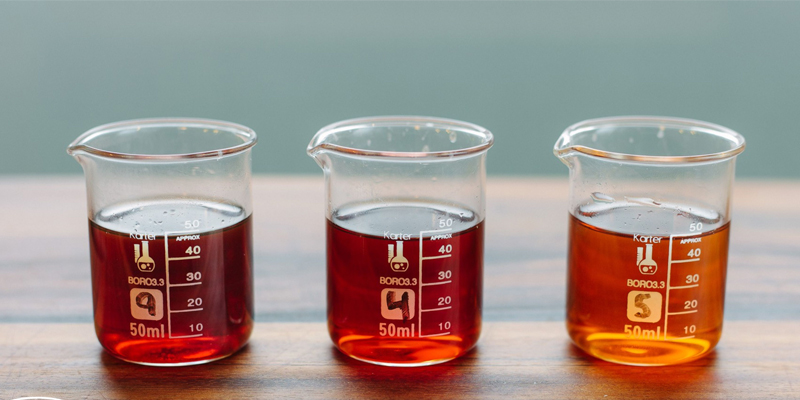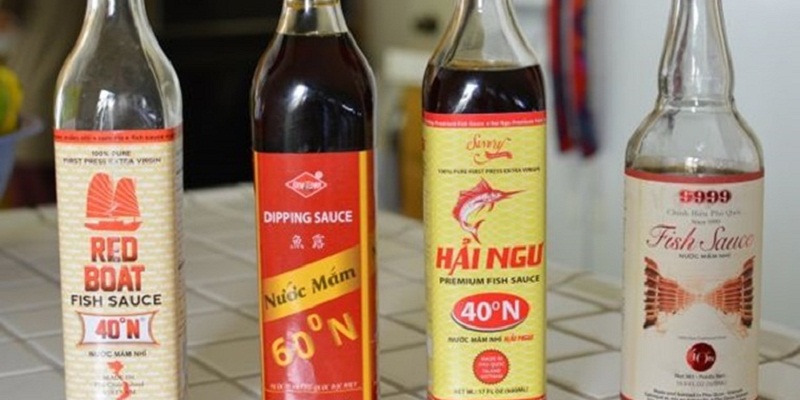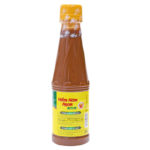The Best Delicious Fish Sauce
Anchovies are a type of fish that feed on plankton near the ocean’s surface and have a low fat content. When producing fish sauce, they won’t produce a layer of fat, and there won’t be any rancid smells, unlike other types of fish. Anchovies undergo a more thorough hydrolysis process than other fish, so after a maturation period of 6 to 12 months, the fish sauce will no longer have a putrid smell.
The First Extract of Fish Sauce is Called the Base or First-Press Fish Sauce

It is called the first-press fish sauce because it is the first drop harvested after 1-2 years of maturation, and it is the most fragrant and precious.
According to Vietnamese standards TCVN 5107: 2003, fish sauce is classified into 4 types:
– Special grade: More than 30N g/l of nitrogen.
– Premium grade: More than 25N g/l of nitrogen.
– Grade 1: More than 15N g/l of nitrogen.
– Grade 2: More than 10N g/l of nitrogen.
Anything below 10 degrees of nitrogen is not considered fish sauce but rather a dipping sauce.
It has a tangy and sweet taste that is so addictive that you’ll be hooked after the first try.
Higher Nitrogen Content Doesn’t Always Mean Better Quality

During the fermentation process, the nitrogenous compounds in the fish break down into various amino acids, which are organic nitrogen compounds. A small portion of the fish’s nitrogenous compounds also break down into ammonia and ammonium salts, which are inorganic nitrogen compounds. The total nitrogen content, which includes both organic and inorganic nitrogen, is what is displayed on the fish sauce label.
Only organic nitrogen is beneficial to health and gives the fish sauce its rich and savory flavor. Traditional fish sauce also doesn’t exceed 40N g/l of nitrogen. Therefore, it is better to choose fish sauce with a higher organic nitrogen content rather than total nitrogen content.
Fish sauce with high total nitrogen content is usually enhanced with urea, MSG, or vacuum-concentrated, which alters its original pure flavor.
Pure Sea Salt Produces the Best Fish Sauce
Pure sea salt typically has a NaCl concentration of over 95%, and it must be stored for at least a year to allow the bitter and astringent flavors to dissipate. At this point, the salt will impart a mild salty-sweet taste to the fish sauce.
Add Fish Sauce Just Before Turning Off the Heat
It is not recommended to marinate meat with fish sauce as it will make the meat tough. For soups, meat dishes, and stir-fries, add the fish sauce at the very end, about one minute before turning off the heat, to preserve the nutrients and sweet taste of the fish sauce.
Fish Sauce Cannot Replace Meat Protein
Although fish sauce has a significant nitrogen content, it cannot replace the protein from meat or fish. Fish sauce is a seasoning used to enhance the flavor of dishes, and we only use a small amount in our cooking, which is not sufficient to provide the body with the necessary protein. Therefore, it cannot substitute for meat or fish protein.
Color Change in Fish Sauce is Normal

Over time, fish sauce may undergo oxidation, and traditional fish sauce usually doesn’t contain artificial colors. Therefore, if the fish sauce changes color, it is a normal phenomenon and doesn’t affect its quality.
Arsenic in Traditional Fish Sauce is Not a Concern
Traditional fish sauce is made from seafood, which naturally contains arsenic. The higher the nitrogen content, the more arsenic is present. Arsenic exists in two forms: organic and inorganic. Arsenic from seafood is organic and harmless to health. On the other hand, inorganic arsenic is harmful.
Don’t Store Fish Sauce in the Refrigerator
Low temperatures can cause the salt in the fish sauce to settle at the bottom of the bottle, making the sauce above it less salty and poorly preserved. As a result, the amino acids will turn black due to decomposition.
Not All Traditional Fish Sauce Has a Strong Odor
During the fermentation process, using saturated salt once will inhibit the components and bacteria that cause the fishy odor. Therefore, traditional fish sauce usually doesn’t have the putrid smell of spoiled fish.
On the other hand, if the fish sauce is made by stirring and adding salt multiple times, it will be difficult to inhibit the odor-causing bacteria. Similarly, using spoiled fish to make fish sauce will result in a distinct putrid odor.
4 Strategies for Storing Chili for One Month
Do you want to enjoy the fresh, spicy flavor of chili peppers all month long? Look no further! This article provides tips and tricks for storing chili peppers so that they stay fresh and flavorful for up to a month. Learn how to best preserve your peppers and savor their zesty taste for weeks to come.
Picking the Best Traditional Fish Sauce for a Delicious and Secure Meal
 Sauce for a Delicious and Secure Meal’>
Sauce for a Delicious and Secure Meal’>Cooking with fish sauce can be daunting, but with these expert tips, you can be sure to choose a quality and delicious condiment that is also safe to use. Read on to find out the best tips to identify a good fish sauce in the Vietnamese cuisine.




































